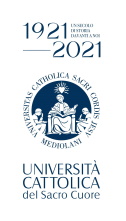- Milano
- Ph.D. School in Economics and Finance – DEFAP
- Research Groups
- Public and Political Economics
Public and Political Economics
The Public and Political Economics group join together economists interested in researching in the general area of public and political economics. The group aims to act as a catalyst for researchers widely working on these fields in the Università Cattolica del Sacro Cuore (Milano) and in other universities. It also encourages collaborative research among and between Faculties members and doctoral students and with the wider academic community. Most of the members of the group also belong to CIFREL, a Research Center in Public Economics located in the Catholic University but that has as members, public economists working in several other universities in Northern Italy.
Members of the group have published their works on the most prestigious journals in the profession (such as American Economic Review, Journal of Public Economics, Economic Theory, Games and Economic Behavior, etc).
Below we first list the members of the research group. We then present a list of specific research topic in which group members are active.
Research Topics
Positive Political Economy and Policy Agency Models. Political Economy focuses on the study of the application of economic analysis to political institutions and their effects on economic outcomes. The main goal is to build positive models capable to provide predictions on the behaviour of economic agents involved which are then taken to data.
Antitrust Analysis. Antitrust Analysis draws on the literature of industrial organization to provide a strong economic basis to the design of a crucial institution of market economies. The main goal is to guarantee that free market behaviour may lead to efficient social equilibria even under imperfectly competitive markets.
Fiscal federalism. The theory of fiscal federalism examines both normatively and positively the performance of decentralized systems in which governments are subject to specific fiscal and political incentives. Members of the group have large experience in working with data on local government, in particular in Italy.
Regulation of public utility markets. Regulation and market architecture applied to recently liberalised/privatised industries such as electricity, railways and telecommunications. Auction theory applied to wholesale electricity markets. Empirical analysis of bidding behaviour and efficiency results.
Institutional Aspect of EU Organization. The EU provides an interesting, albeit little studied, field for both economic and political analysis. Previous work in this field in the group has analysed the legitimacy of European institutions such as the European Parliament and specific institutional features such as Enhanced Cooperation Agreements.
Optimal taxation. The Mirrleesian theory of optimal taxation concerns how various forms of taxation should be designed to maximize social welfare in an economic environment populated by heterogeneous agents.
Secession Theory. Traditionally, economists have taken the borders of national states as given. But as a matter of fact recent years have witnessed both process of unification, with the formation of supranational unions or federations, and process of division inside pre-existing countries. This topic studies the economic and political incentives for the separation or the unification of countries.
Tax Evasion. The theoretical and empirical analysis of the determinants and of the impact of tax evasion at national and regional level.
Political Economy of News Media (or Mass Media). The political economy of media focuses on the theoretical and empirical analysis of: i) The effects of news media on political and public policy outcomes; ii) The presence and the drivers of the distortions observed in the market for news; iii) The scope for public intervention in the market for news; iv) The role of new types of news media (e.g., blogs, news aggregators, social media) that emerged from the creation and diffusion of the Internet.
Health Economics. Efficiency analysis in the production of health services by hospital units. Models of interaction between doctors and patients. Optimal pricing of pharmaceutical drugs. Issue in the sustainability and financing of health services, both at the aggregate and local level.
Targeted policies: redistributive effects and political economy issues. To analyse whether targeting and means testing improve the redistributive effect of public policies and increase their efficiency, respectively. And to appraise the political economy mechanism that drive majority voting on the provision of in-kind transfers and the on the design of targeted policies.
Experiments on Public and Political Economics. Lab experiments are used to test the main theoretical findings of several researches. Currently, a research project is on tax saliency, with reference to wealth taxes and income taxes.
Comparative Political Economy. Different electoral systems analysed focusing on informational structure available to politicians and voters.
Presentation of the Research Group
